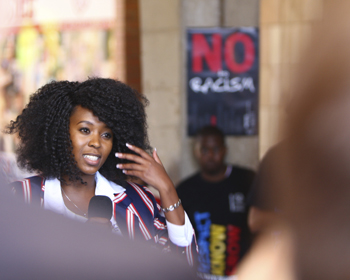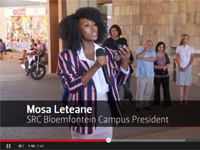
SRC President, Mosa Leteane
Photo: Hannes Pieterse |

Launch of the No-to-Racism/Yes-to-Equality Campaign : Video
In support of National Human Rights Month, the UFS has launched the No-to-Racism/Yes-to-Equality Campaign. Through this campaign, the entire UFS community reaffirms its commitment to equality, respect, democracy, social justice, humanity, dignity, human rights, and diversity.
The first leg of the campaign, No-to-Racism, was launched at the Qwaqwa, Bloemfontein and South Campuses during the past month. “Look in the mirror tonight and have a discussion with yourself,” Prof Jonathan Jansen, Vice Chancellor and Rector of the UFS, said during the launch at the Bloemfontein Campus. “Ask yourself to what extent can I truly say, ‘I am dealing with my racism, my bigotry, my ethnicism, my homophobia, my xenophobia? Am I truly dealing with those in my life?’”
Through the No-to-Racism Campaign, staff and students are encouraged to take a public stand against not only racism, but also homophobia, sexism, ableism, xenophobia, classism, ethnicism, ageism, and all forms of intolerance and othering.
The start of No-to-Racism will closely be followed by the Yes-to-Equality Campaign, which will be launched on 1 April 2015.
SRC President, Mosa Leteane, urged the Kovsie community to make South Africa work. “We say ‘no’ because we want to say ‘yes’. Fix your ‘no’ so that your ‘yes’ is clear, it’s equal, it’s honest. That is what ‘yes’ looks like.”
The campaign is also aligned with the declaration made by the UFS Council in November 2014 in which it was stated that “the Council of the University of the Free State believes very strongly in the human dignity, equality, and freedom of all people. Accordingly, the Council reaffirms its abhorrence of acts of racism, sexism, and unfair discrimination of any kind or in any form”.
The No-to Racism/Yes-to-Equality Campaign is an initiative of the Institute for Reconciliation and Social Justice, together with the SRC.
Important dates:
1 April 2015: Launch of Yes-to-Equality Campaign on the Qwaqwa and Bloemfontein Campuses
13 April 2015: Pledge of the UFS community at 12:45 on the Red Square, Bloemfontein Campus
For more information or enquiries contact news@ufs.ac.za.